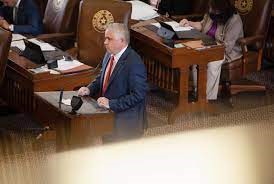
The legislative session has completed its 14th week. 7 weeks to go. Here’s what’s happening:
House Passes Property Tax Relief

Reducing the property tax burden for home and business owners has been a top priority for state leadership this session. The Senate has already passed their version of property tax relief, and this week the House passed their version of the measure. House Bill 2 – a priority of House Speaker Dade Phelan – provides school districts with an additional $12 billion in state funds so the districts can lower the property taxes on residents and businesses. The main provision of the bill addresses the appraisal cap on how much a home’s taxable value can rise from year to year. The proposal lowers the current cap from 10% to 5% and applies that cap to homes as well as businesses. The House takes the approach that the rapid growth in several communities in the state has caused appraisals to soar, and the reduction of the cap will provide greater stability for property owners.
The Senate has taken a different approach by raising the homestead exemption – the amount of a home’s value that cannot be taxed – from $40,000 to $70,000. This proposal passed the Senate two weeks ago but has not received a hearing on the House side. With both chambers promising billions in property tax relief, and those figures being factored into the state budget, the leadership is now tasked with deciding which proposal will move forward. But that process has not shown much promise so far. Yesterday, before the House even began debate on their property tax package, Lt. Governor Dan Patrick issued a statement that the House plan is not a sufficient solution to property tax relief, and the Senate will not give it consideration.
State Budget Moving Through Process

Last week, the House passed HB 1, the state budget, which is the only must pass bill for the session. The House version spends a total of $307 billion, including $137 billion in state funds. The Senate Finance committee earlier this week passed the Senate version of HB 1, which spends $308 billion, including $142 billion in state funds. There are some differences in the budgets between the two chambers. One of the main differences – which could also lead to further differences that will have to be addressed – is in the Senate version that appropriates $10 billion for a package of legislation that has already been passed by the Senate to address electric grid reliability issues. The House did not fund these measures. The House appropriates $545 million to install air conditioners in all state prisons, the Senate version has no such provision.
Both sides approved billions for the above mentioned property tax relief, increased mental health services funding, state employee and teacher pay raises, increased funding for school safety and security measures, increased funding to address issues with the state foster care system, and increased border security funding. The Senate is expected to pass their version next week, and the bill will then go to a conference committee to work out the differences between the two chambers.
Busy Committee Week in the House

On Monday, the House Ways and Means Committee heard a proposal to replace a recently expired tax incentive program which would provide school district property tax breaks for certain infrastructure and economic development projects. The proposal seeks to incentivize companies to invest in projects by providing a 10-year property tax break, with the goal of creating more jobs and economic growth. Eligible projects include those related to the oil and gas industry, water infrastructure and flood mitigation projects, manufacturing, and supply chain infrastructure. The committee heard hours of testimony from supporters – mainly in the business industry – that said the incentives are needed to keep Texas competitive. Opponents paint the program as corporate welfare, since it the state would be providing tax breaks to highly profitable companies.
On Tuesday, the House Public Education Committee heard HB 4340, which is he House version of the voucher bill that passed the Senate last week. The House bill differs in the fact that it prioritizes the students who will have access to the state funds for private school tuition. HB 4340 prioritizes economically disadvantaged students for receipt of the state funds. After hearing from hundreds of witnesses and several hours of testimony, the bill was left pending. The Senate bill passed by an 18-13 vote, largely along party lines.
On Wednesday, the State Affairs committee heard a bill that would significantly expand the state’s ability to enforce immigration law. The calls for a new border protection unit within the Department of Public Safety. Members of the new unit would be allowed to arrest, detain, and deter individuals attempting to cross the border. The unit would be comprised of civilians, but they must have some sort of law enforcement background. More than 300 people signed up to speak against the bill, including representatives from the Texas Civil Rights Project and other immigration and humanitarian related organizations. The hearing lasted until 1AM, and the bill was left pending. The bill is a priority of House Speaker Dade Phelan, so it is likely to be approved by the committee next week.
Abbott Seeking Pardon for Daniel Perry

A jury in Austin last Saturday convicted Daniel Perry of murder in connection with the shooting death of a participant at a Black Lives Matter protest in May of 2020. Perry, working as an Uber driver at the time, was approached by a protestor carrying an AK-47 assault rifle. Perry, who was armed with a pistol, said he felt his life was in danger, and shot the protestor through his car window, killing the protestor. During the trial, Perry said he was acting in self-defense. The jury in Austin felt differently and convicted Perry of murder.
Gov. Abbott immediately announced he would be seeking a pardon for Perry, saying this was an unjust conviction, comparing Perry’s actions to those of Kyle Rittenhouse, the Wisconsin man who was acquitted of charges that involved similar circumstances during protests in that state. Abbott cannot pardon anyone without first receiving a recommendation for a pardon for the state Board of Pardons and Paroles. Abbott said he has already asked the board to review the case to determine if Perry should be granted a pardon. A pardon would release Perry from the conviction and have his record expunged.
Rep. Bryan Slaton Facing Calls for Resignation

Rep. Bryan Slaton, a Republican from Royse City near Rockwall in north Texas, is facing calls for his resignation after allegations he is having an inappropriate relationship with a 19-year-old intern in his office. A formal complaint has been filed with the House General Investigating Committee, and two of Slaton’s Republican colleagues have publicly called for his resignation. Slaton, who is a former minister and youth pastor, has not responded to the allegations. He has hired a criminal defense lawyer who issued a statement saying the allegations are “outrageous and false.” The chairman of the House General Investigating Committee has simply said they will not comment on the matter at this time, but did acknowledge receiving the complaint. Slaton is no stranger to controversy. Slaton, who is married with a young child, is one of the most socially conservative members of the House. He is known specifically for his anti-LGBTQ views, and for his clashes with House leadership. Rumors have been swirling throughout the Capitol all week regarding this matter, and Slaton was absent last week for the debate and vote on the state budget. He returned to the House floor on Monday, but deferred all questions to his attorney.
The House General Investigating Committee has jurisdiction over workplace complaints in the House. Investigations are conducted by independent investigators who then give the results to the committee. After deliberations of the findings of the investigation, the committee then sends their report – with recommendations — to the full House for action. The House can expel a member with an affirmative vote from 100 or their 150 members. Or, they can censure the member under investigation by a full majority vote.
Political Notes
Chris Hollins, the former Harris County clerk, officially dropped his bid for mayor of Houston this week and will instead run for city Controller. Hollins, considered a long shot for mayor, dropped out after Congresswoman Sheila Jackson Lee entered the mayor’s race. After Hollins made the switch, Lee sent out a statement congratulating him on his candidacy for Controller, but did not endorse him for the position.
Houston Senator John Whitmire, already an announced mayoral candidate, has picked up an opponent should he end up seeking reelection to the Senate. Whitmire, a Democrat and longest serving member of the Senate, will be challenged by political newcomer Kathrik Soora, who calls himself a “fresh-faced progressive reformer.” In his announcement, Soora criticized Whitmire’s long tenure in Austin saying that Whitmire is a politician that puts his own interests above those of his constituents. Interestingly, Soora also released a poll showing that 40% of the likely voters in the district would support Whitmire should he seek reelection to the seat in 2024. Soora claims that demonstrates that 60% of the voters are open to another candidate. Whitmire can retain his Senate seat and still run for mayor since the mayoral election is in November of this year. However, if his mayoral race is not successful, he must run for reelection to his Senate seat in the 2024 election cycle.
Former Congressman Will Hurd (R, San Antonio) is heading to Iowa, fueling further speculation about a run for the Republican Presidential nomination next year. Hurd will be part of the Iowa Faith and Freedom Conference, which is considered a kickoff event for the 2024 campaign. Senator Ted Cruz turned down an invitation, saying he is focused on reelection to his Senate seat in 2024. Gov. Abbott also declined to participate, saying he is “100% focused on the Texas legislative session.” The event is next weekend in Clive, Iowa.
Activity this Week
This week the Senate approved, among other bills, legislation that would prohibit a college or university professor from compelling a student to adopt a certain set of beliefs regarding race, ethnicity, sexual preference, religion, or political ideology. The Senate also passed legislation to expand mental health treatment for children, and a bill to ensure parents are informed as to what types of books are available to children in public schools. One of the more controversial bills passed this week in the Senate prohibits cities and counties from using public funds to hire registered lobbyists, or participating in a trade association – such as the Texas Municipal League – that hires lobbyists. This is the third session in a row that the Senate has passed this measure, that in turn dies in the House. Prospects for passage in the House are again dim this session. The Senate has adjourned for the weekend and will reconvene on Monday.
The House this week passed measures including a bill that decriminalizes fentanyl testing strips and another to require the state remain on daylight savings time year-round. Although the latter would ultimately require the approval from Congress. The House met Friday to consider their first “uncontested” calendar and then will adjourn for the weekend and convene on Monday.
What’s Next??
Next week, committees on both sides of the rotunda will have very full agendas throughout the week. End of session deadlines are approaching, and members are pushing for committee hearings so they can attempt to get their bills to the floor before time runs out.
When lawmakers return Monday, there will be 42 days remaining in the session.
